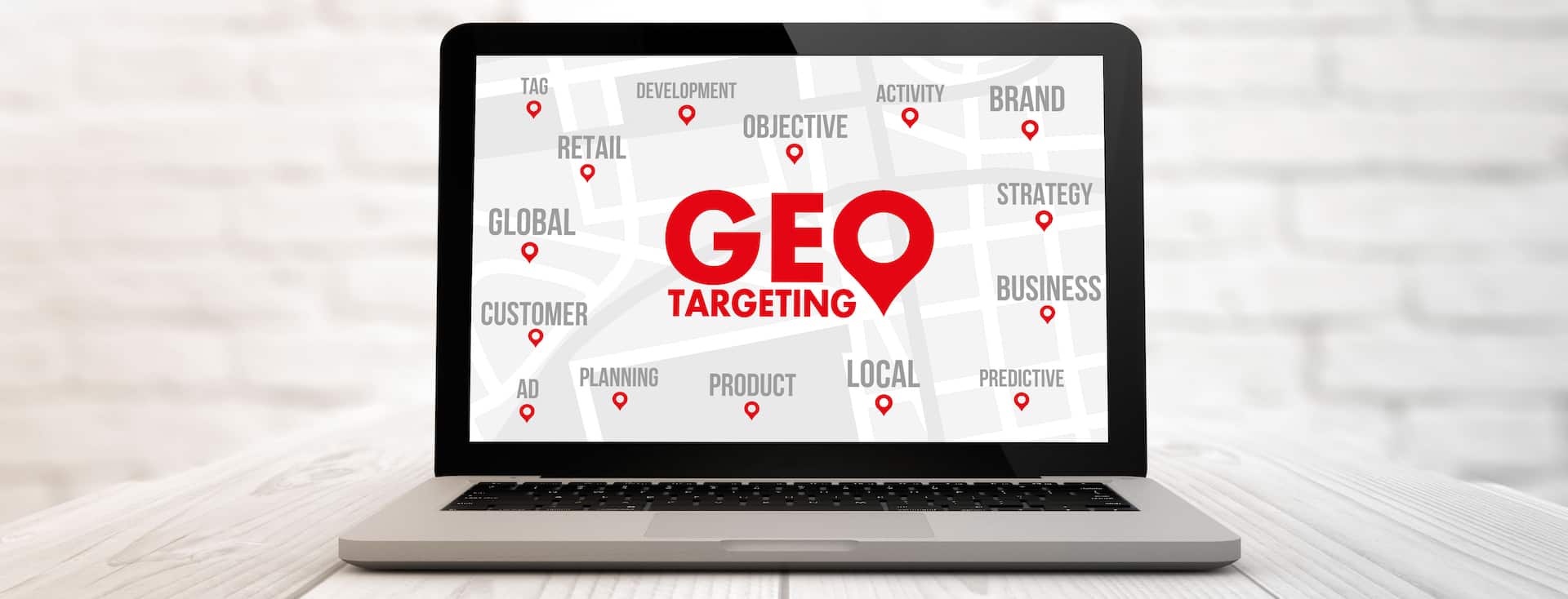
Geo Targeting: A Powerful Content Marketing Strategy


Geo targeting is a local content marketing strategy that involves analyzing each consumer’s geographical location and creating different content on the basis of that analysis, providing a way to display relevant content to consumers in a particular location in the form of geo-specific pages. Used correctly, local content marketing can be a powerful tool to boost your search engine optimization, increase your lead generation, and improve conversion rates. However, a poorly executed strategy can actually prevent your content from showing up in searches at all.
Businesses That Can Benefit From Geo Targeting
The practice is typically thought of as a tool for small, local businesses trying to attract customers to a physical location. Examples include service providers (plumbers, dog walkers, auto mechanics, etc.), retail shops, and restaurants. When it comes to ranking for the most relevant keywords, local businesses are often in competition with nationwide chains providing the same or similar products and services. It is a David-and-Goliath situation in which the small competitors are up against large brands with significant budgets devoted entirely to SEO. Creating geo pages built to respond to location-specific keywords can help to level the playing field and secure a better spot for your content in search results.

However, local content marketing can also be valuable to large, widespread businesses in attracting customers to particular locations. As one lead generation expert put it, the “best dollars are many times spent targeting locals.” Why? Because both search engines and consumers have an innate, built-in preference for local content. A generic landing page is unlikely to resonate strongly with customers if the content looks as though it could apply equally to any area of the country. Not only that, but a landing page that is not optimized for a specific locality may not rank highly in results because search engine algorithms may not find it relevant.
Sometimes geo targeting is even necessary for the business to operate properly. Take ride-sharing services such as Uber or Lyft, for instance. If you’re in San Francisco, it doesn’t do you any good to summon a ride from a driver located in Boston. The success of the business depends entirely upon accurately determining where consumers are accessing the app from and showing them results relevant to their location.
SEO Advantages
Local content marketing can go beyond merely improving your position in search rankings. It can help you to prevent unlikely prospects from viewing your content while helping you connect to the consumers most likely to buy. At its most sophisticated, it can help you to tailor content to be rhetorically effective for particular demographics.
1. Selective Locations
If you’re running a local business and you only serve a particular area, you want your content to be seen by customers within that particular region and avoid being seen outside it. This is particularly important if you are using pay-per-click advertising. Every visit to your site costs you money, so you want to prevent consumers from outside your service area clicking on your ad due to error or idle curiosity if it is not going to result in a sale. Local content marketing can allow you to show content exclusively in certain areas where you do business and exclude consumers from areas where you do not.
2. Relevant Results
On the flip side, there are companies that do business around the country but that may have only one, or very few, physical locations. Search engines may look at the location of the business relative to the location of the search and conclude that the content is not relevant if the two locations are far apart. Location-specific geo pages are one way to demonstrate the validity of your content relative to the local search terms used.
3. Demographic Marketing
The more specific you can get in determining consumers’ locations, the more information you can glean about them in terms of their demographics, which can help you market goods and services to them more effectively.
Say, for example, that you run a regional chain of car dealerships. Some dealerships specialize in luxury models while others offer more economical choices. You can use your customers’ locations to predict which type of car they may be more interested in buying and show them content relevant to their perceived needs.
In other words, if the search comes from a more affluent neighborhood (as determined by ZIP code), you can show them information about brand-new luxury cars just arrived to the lot. On the other hand, if the search comes from a more middle-class neighborhood, you can show them the latest deals on economy models.
Tips for Success

As with so many human endeavors, there is a right way to approach local content marketing and a wrong way. The wrong way is to create a bunch of generic geo pages from the same template with no location-specific information other than the name of the community, providing no valuable information and serving no purpose other than to garner search engine hits and then shuttle consumers along to the main content page. Google calls these “doorway” pages and often limits them in search results in the interest of curtailing web spam.
Avoid Rookie Mistakes
You can create effective geo pages for multiple locations and avoid making doorway pages likely to be penalized by search engines with the following techniques:
- Provide information that is valuable to your prospective customers.
- Incorporate keywords naturally into text meant to be read by a human.
- Connect your geo page to other areas of your site for easy navigation.
- Create unique content for each specific page.
Utilize Google Analytics
An effective local content marketing campaign depends on creating content that is relevant to a particular area. To accomplish this, you must know where your audience is coming from. Google Analytics is a tool that can allow you to locate visitors to your site from the national to the city level. Knowing where your customers are coming from gives you insight as to what types of content they are looking for and what information is relevant to convey.
Make Your Content Mobile-Friendly
Because nearly 60% of all Google searches now take place on mobile devices, optimizing your local pages for mobile users is crucial to the success of your local content marketing campaign. Rather than conducting detailed, in-depth research, mobile searchers are typically looking for practical information such as prices, contact information, and directions. Your local landing pages should be configured to provide this information right away; both consumers and Google tend to appreciate this and reward you for it. Proximity of the target to searchers’ current locations is also very important; 58% of smartphone searches take place outside the home, and 50% of searchers on smartphones and tablets are looking for results within walking or driving distance of their current location.
Get the Help You Need
Creating effective geo pages requires a great deal of time and at least a little creativity. For many businesses, these two commodities may be in short supply. If that’s the case, outsourcing creation of geo pages to high quality content writing services can be a valuable investment.
- Finding Effective Keywords To Incorporate Into Your Content Strategy - December 17, 2023
- Successful Viral Content: 7 Techniques to Help You Connect With Your Customer Base - December 14, 2023
- Geo Targeting: A Powerful Content Marketing Strategy - December 6, 2023

